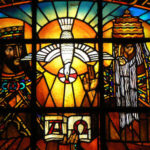We run our website the way we wished the whole internet worked: we provide high quality original content with no ads. We are funded solely by your direct support. Please consider supporting this project.

Knowing the Eternal God
If all our knowledge about God is to be oriented around the cross, as I argue in many places (see this post for instance), what does this mean for how we reflect on God’s transcendence? In other words, how can we speak of God’s eternal being since there obviously was no cross within God prior to, and apart from, the fallen world?
To begin, let me say that I cannot throw my hat in the ring with that radically temporalistic strand of contemporary theology that virtually does away with any distinction between God’s eternal being and his revelation in Christ. In technical terms, they eliminate the distinction between ad intra (his eternal being) and ad extra (his revelation). Hence, for example, Eberhard Jüngel and Jürgen Moltmann define God as “the event” in which he reveals himself in Jesus Christ.
By contrast, I affirm the ad intra/ad extra distinction. But I also fully embrace Karl Rahner’s teaching that, if the way God is toward us in Christ truly reveals God, then there must be, at the very least, a strong analogical correspondence between God’s immanent eternal being and his economic revelation in Christ. But this correspondence allows me to affirm contingent aspects of his revelation toward us —aspects such as his becoming-human and his becoming-sin—that we must consider to be absent in the way God exists within his threefold self prior to and apart from creation.
While a great deal could be said about this matter, the point I want to make about his eternal being ad intra concerns the character of his threefold identity. That is, while there is obviously no Incarnation or Crucifixion within the immanent Trinity prior to creation, we must affirm that the infinitely intense love of God that is expressed when God stooped an infinite distance to become our sin and our curse on Calvary expresses the unsurpassable intensity of the unwavering perfect love that the three divine Persons have for each other throughout eternity.
Moreover, inasmuch as the Church as the bride of Christ is a contingent expression of the Father’s perfect love for the Son that is mediated by the Spirit, and inasmuch as the bride, abiding in the Son, shares in the Son’s reception of the Father’s perfect love and participates in the Son’s perfect love for the Father mediated through the Spirit, we must go further and add that God’s revelation to us expresses, and even participates in, the perfect eternal love that unites the triune fellowship throughout eternity.
The best expression in Church history of the infinitely intense triune love that is revealed on the cross and that characterizes God ad intra, in my estimation, is found in the concept of the perichoresis of the three Persons. In essence, this concept stipulates that the other-oriented love of the three divine Persons is such that throughout eternity they have completely given themselves over to one another and thus fully dwell within one another. This is the infinitely intense, triune, mutually-indwelling love that is incarnated and revealed in Christ and that the Church is graciously made a participant of.
Photo credit: kafoster27 via Visualhunt / CC BY-ND
Category: General
Tags: Cross, God's Character, Perichoresis, Trinity
Related Reading

What Makes the Good News So Good
While God was revealed in various ways and to various degrees through the law and the prophets of the Old Testament, in Jesus we finally have the one who is “the exact representation of God’s being” or essence (hypostasis, Heb. 1:1-13). This is the heart of the Good News that reverberates throughout the New Testament.…

The Perfect Love of God
The Father, Son and Spirit exist as the infinite intensity and unsurpassable perfection of eternal love. We know this about the triune God not by speculation but because Jesus demonstrated that love (Rom 5:8) in his willingness to go to the furthest extreme possible to save us. When the all-holy God stooped to become our…

Greg Interviews Jeremy Jernigan on “Redeeming Pleasure”
Greg: Thanks for agreeing to this interview Jeremy. Having read your soon-to-be-published book Redeeming Pleasure, I’m really looking forward to its September 15 publication. Okay, to get started, suppose I’m a stranger and we meet in an elevator. I notice you have a book. I ask who wrote it and you tell me you did. I then…

The Holy Spirit Behind the Scenes
In John 17 we read Jesus’ prayer to be one with each another in Christ. Jesus prayed that his disciples … may be one. As you, Father are in me and I am in you, may they also be in us. … I in them and you in me, that they may become completely one,…

Is God Immutable? Part II
Yesterday, we looked at the common understanding of divine immutability and the problems inherent to it. Click here to read that post. Today, let’s look at what the immutability of God actually means. Instead of accepting Plato’s misconceived ideas about perfection, followers of Jesus should keep our eyes focused on Jesus and thus view all…

Hearing and Responding to God: Part 5
We hope you’ve enjoyed this series on hearing and responding to God. In this last video on the topic, Greg discusses the significance of the fact that God IS love, and how our communion with him is the product of God’s eternal loving nature. You can watch the earlier installments here, here, here, and here. ***Bonus: Greg experiences a…
